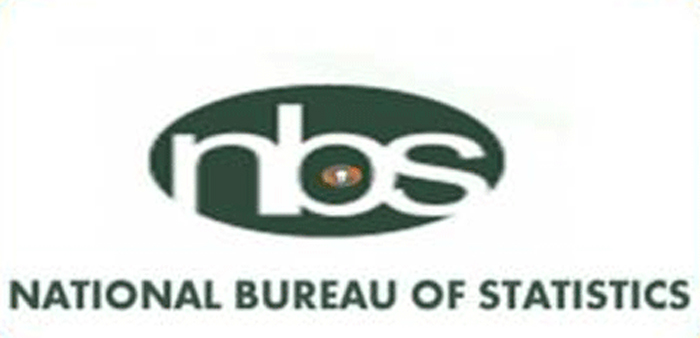
By Emmanuel Elebeke
The National Bureau of Statistics says Nigeria’s commodity group import index rose by 1.89% in Q3 2020.
The NBS disclosed this in its quarterly Commodity Price Indices and Terms of Trade (Q3 2020) published on its website. According to the report, the rise in the commodity importation was driven mainly by an increase in the prices of Metals, Live animals and animal products.
The all commodity group export price index in the same quarter averagely decreased by 0.30% due to decreases in the products of the chemical and Allied industries, Base metals and articles of base metals.
Similarly, the all products terms of trade (TOT) index on average decreased by 2.13%, as a result of decreases in the prices of the products of Chemical and Allied industries, Base Metals and Articles of BaseMetals, Live animals and animal products.
For the all-region group export, NBS said the index also decreased by 0.3% mainly due to decreases in the prices of exports to Africa, America and Europe. On the contrary, the all-region group import index increased by 1.89% due to increases in import prices of goods exports to Africa, America and Europe and Oceania.
ALSO READ: Alleged certificate forgery: Judge’s health stalls hearing in suit against Obaseki
However, all-region terms of trade on average decreased by 2.13% due to decreases in export prices to Africa, America, Europe and Oceania.
Nigeria’s major trade partners in Q3 2020 were India, Spain, the Netherlands, Turkey and China. The major exports to these countries were crude petroleum and natural gas while the major imports were Motor spirits, motorcycles and antibiotics.
The all commodity group import index also in the period in review rose by 1.89% between July and September 2020.
This was driven mainly by an increase in the prices of Products of the chemical and allied industries (9.55%), wood and articles of wood (4.37%), and live animals; animal products (4.06%).
However, it was negatively affected by the decline in the prices of Prepared foodstuff: beverages (-5.07%), textile and textile articles (-1.07%) and Raw Hides & skins, leather (-0.92%).
Between July and August 2020, the all commodity group import index rose by 2.49%. This was driven mainly by Products of the chemical and allied industries, which rose 6.8%, Vegetable products (6.07%) and Animal and Vegetable fats and oil (6.05%) but was negatively affected by the decline in prices of Prepared foodstuffs; beverages, spirits and vinegar (-5.19%), Textiles and textile articles (-2.75%) and Raw hides and Skin, leather, furskins etc (-2.38%).
Between August and September 2020, the all commodity group import index decreased by 0.60%. This was as a result of a decrease in prices of Animal and Vegetable fats and oils and other cleavage products (- 5.22%), Plastic, rubber and articles (-3.13%) and Vegetable products (-2.50%).
The decline was offset by an increase in the prices of wood and articles of wood, wood charcoal and articles (6.13%), products of the chemical and Allied industries (2.73%), Textile and Textile articles (1.68%).
In the same vein, between July and September 2020, all commodity group export price index decreased by 0.30% due to decrease in the prices of Products of chemical and Allied industries (-2.10%), Base metals and articles of base metals (-1.95%) and Papermaking material (-0.74%).
ALSO READ: Just in: George Nkencho, 27-year-old Nigerian killed in Ireland
However, increases were recorded for Boilers, machinery and appliances (5.38%), Prepared foodstuffs, beverages, spirits and vinegar (1.9%) and Vegetable products (1.05%).
Between July and August 2020, the all commodity group export index increased by 0.22%. This was driven mainly by wood and articles of wood, charcoal and articles (4.78%), Live animals, animal products (1.67%) and Vegetable products (1.60%). It was negatively affected by base metals and articles of base metals (- 1.08%), Plastic rubber and articles (-0.90%) and Papermaking materials, Paper and paperboard (-0.68%).
Between August and September, the monthly percentage change in the All commodity export index stood at -0.52%. This decrease can be attributed to decreases in the prices of wood and articles of wood, wood charcoal (-4.09%), products of the chemical and Allied industries (-1.46%) and live animals, animal products (-0.91%). The decline was offset by higher prices for Boilers, Machinery and Appliances (4.9%), Prepared foodstuffs, beverages, spirits and vinegar (1.60%), Textiles and textile articles (0.81%).
The All commodity group terms of trade index stood at 103.36 in July, 101.08 in August and 101.16 in September.
This represents a decrease of 2.21% in August compared to July but an increase of 0.08% in September against the preceding month. On average, the terms of trade decreased by 2.13% during the third quarter. This decrease is explained by a significant decrease in Products of the Chemical and Allied industries (- 11.06%), Base metals and articles of base metals (-4.23%) as well as Live Animals, animal products (- 3.16%). The decline was offset by higher prices of Prepared foodstuffs; beverages, spirits, and vinegar; tobacco (7.28%) and Boilers, Machinery and Chemical appliances (5.26%).
Between July and August, the all-region group export recorded an overall decrease of 0.30% mainly due to decreases in the prices of exports across Africa (-6.07%), Europe (-0.58%) and America (-0.1%) while Asia was the only region that recorded a positive change (2.75%).
Between July and August, the region group export index recorded a marginal increase of 0.22% but a decrease of 0.52% between August and September.
Vanguard News Nigeria
The post Nigeria’s commodity imports up by 1.89% in Q3 2020 appeared first on Vanguard News.
























0 Comments
Advertise your business here at cheap rate and get large audience to your market. Call/Msg Teemikemedia: 07060733664 to get started.